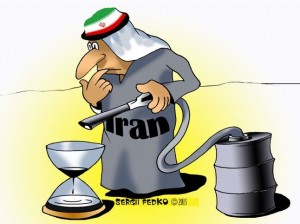Iran is returning the world, at the conference table on foreign policy matters and now asking for accomodations on oil production.
OPEC should make room for increased Iranian crude production within its ceiling of 30 million barrels a day, the nation’s oil minister said, adding the group will probably leave that limit unchanged when it meets next month.
Iran has asked OPEC to accommodate its return to previous production levels when international sanctions are lifted, Bijan Namdar Zanganeh told reporters in Tehran. Iran plans to add 1 million barrels a day within five to six months of the curbs being removed and that increase should be within OPEC’s production ceiling, Amir Hossein Zamaninia, deputy minister for commerce & international affairs, said in Tehran on Saturday.
Brent crude tumbled more than 60 percent since the middle of last year as OPEC followed Saudi Arabia’s strategy of defending its share of the global market against competitors such as U.S. shale producers. The Organization of Petroleum Exporting Countries, which accounts for about 40 percent of global supply, has been pumping above its target level for 17 months. It is scheduled to meet on Dec. 4 to discuss the ceiling.
“I don’t expect to receive any new agreement” at the OPEC meeting, Zanganeh said. “OPEC is producing more than its approved ceiling and I asked them to reduce production and to respect the ceiling, but it doesn’t mean we won’t produce more because it is our right to return to the market.”
Iran was OPEC’s second-largest producer before sanctions over its nuclear program were tightened in 2012. The nation, which reached an agreement with world powers in July over the trade restrictions, is currently the group’s fifth-largest supplier, pumping 2.7 million barrels a day last month, according to data compiled by Bloomberg.
“I sent a letter to OPEC to consider our return to the market and to manage it,” Zanganeh said. “We don’t need to receive any permission from any organization for our return to the previous level of production. It is a sovereign right.”
Most OPEC members see $70 a barrel as a fair price for oil, Zanganeh said. Brent crude last traded at that level in December, days after OPEC gathered in Vienna and opted to resist calls from members including Venezuela to cut output. Brent settled near $45 a barrel in London on Nov. 20.
Venezuela President Nicolas Maduro is scheduled to meet Russian President Vladimir Putin in Tehran on Nov. 23 to work together on oil prices, he said on state television last week. Russia, which isn’t a member of OPEC, is facing competition in Europe after Saudi Arabia reduced pricing for buyers in northwest Europe and started selling in established Russian markets such as Poland.
Russia was lobbied last year by Venezuela as it sought to coordinate action with non-OPEC producers to halt the collapse in oil prices. Global supply and demand is best balanced by the market, Russian Energy Minister Alexander Novak said Saturday in Tehran. Any discounts on Russian crude are a matter for the oil companies and not the Energy Ministry, Novak said.

